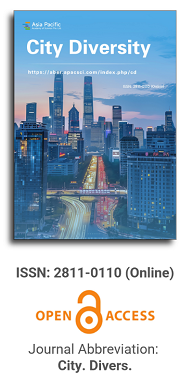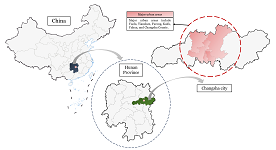
Asia Pacific Academy of Science Pte. Ltd. (APACSCI) specializes in international journal publishing. APACSCI adopts the open access publishing model and provides an important communication bridge for academic groups whose interest fields include engineering, technology, medicine, computer, mathematics, agriculture and forestry, and environment.

As China's pillar industry, the property market has suffered a considerable impact in recent years, with a decline in turnover and many developers at risk of bankruptcy. As one of the most concerned factors for stakeholders, housing prices need to be predicted more objectively and accurately to minimize decision-making errors by developers and consumers. Many prediction models in recent years have been unfriendly to consumers due to technical difficulties, high data demand, and varying factors affecting house prices in different regions. A uniform model across the country cannot capture local differences accurately, so this study compares and analyses the fitting effects of multiple machine learning models using February 2024 new building data in Changsha as an example, aiming to provide consumers with a simple and practical reference for prediction methods. The modeling exploration applies several regression techniques based on machine learning algorithms, such as Stepwise regression, Robust regression, Lasso regression, Ridge regression, Ordinary Least Squares (OLS) regression, Extreme Gradient Boosted regression (XGBoost), and Random Forest (RF) regression. These algorithms are used to construct forecasting models, and the best-performing model is selected by conducting a comparative analysis of the forecasting errors obtained between these models. The research found that machine learning is a practical approach to property price prediction, with least squares regression and Lasso regression providing relatively more convincing results.
Ethno-education: Health education based on cultural diversity cultural diversity
Vol 5, Issue 1, 2024
Download PDF
Abstract
Introduction: In a multicultural country such as Colombia, ethnoeducation is an important component of health education, because it promotes the quality of life of ethnic minorities based on the community’s potential, practices, habits, experiences and approaches that promote overall health awareness. The purpose of this article is to perform a narrative review on the background of ethnoeducation and its impact on health. The development of inter-cultural skills among students in health fields would enable the future professional to perform their roles with adequate cultural relevance, respecting the values, traditions and history of the communities. Topics discussed: Worldwide, ethnoeducation has been highly relevant, and some international organizations have worked on its implementation for decades. In Colombia, several legal and regulatory instruments have been developed to implement ethnoeducation. However, close to 86% of the ethnic populations do not have access to education in accordance with the established principles. The importance of ethnoeducation has been highlighted in several countries in that it has achieved positive results such as a reduction of morbidity and mortality through educational activities that promote health and help prevent diseases. To achieve this, it is essential that the planned activities be integrated into the communities’ cultural perceptions. Conclusion: Although local, national and international guidelines have been established, ethnoeducation continues to be a challenge. It is necessary to increase efforts in order for ethnoeducation to achieve the objectives that have been set out from a theoretical perspective.
Keywords
References
- Acar Y, Gürol M. Conceptual Framework Regarding the Multicultural Education Competencies of Teachers. H. U. Journal of Education. 2015; 30(1): 0114.
- Reap M, Pornwattanavate S, Thame C, et al. The social determinants of health of the Urak Lawoi’ of southern Thailand. BMC Public Health. 2020; 20(1). doi: 10.1186/s12889-020-8283-y
- Castillo Bernal E, Hernández Bernal E, Rojas Martínez AA. Los etnoeducadores: esos nuevos sujetos de la educación colombiana. Revista Colombiana de Educación. 2005; (48). doi: 10.17227/01203916.7716
- Izquierdo Barrera ML. Education in multicultural contexts: ethno-educational and intercultural experience with the indigenous population of the Embera Chamí-Mistrató Resguardo, Risaralda-Colombia (Spanish). Zona Próxima. 2022; (29): 1-22. doi: 10.14482/zp.29.0002
- Siraj HH, Zamzam R, Ismail J, et al. Managing Diversity: A ‘Must-Have’ Skill for Medical Students. Procedia-Social and Behavioral Sciences. 2011; 18: 379-383. doi: 10.1016/j.sbspro.2011.05.054
- Ali MA, Halim MU. Recent ideas on ethnic diversity in medical education: one step forward, two steps back? Medical Education. 2014; 48(4): 451-451. doi: 10.1111/medu.12383
- Del Pozo F. Social education for health: projection, action and professionalization. Risaralda Medical Rev. 2013; 19(1): 75-80. doi: 10.22517/25395203.7881.
- Triviño Garzón L, Palechor Arévalo L. Logros y retos de la etnoeducación en Colombia. Universitas. 2007; 1(7): 145. doi: 10.17163/uni.n7.2006.06
- García W, Martín, M. Historical review of the indigenous educational phenomenon in northeastern Cauca (Colombia). Spanish Journal of Comparative Education. 2011; 18: 279-302.
- Flores I, Palacios N. Cultural and Intercultural Education: Experiences of Ethnoeducational Teachers in Colombia. Australian Journal of Teacher Education. 2018; 43(7): 62-81. doi: 10.14221/ajte.2018v43n7.4
- Kachalov N, Kornienko A, Kvesko R, et al. Interdisciplinary Competences and Their Status Role in the System of Higher Professional Education. Procedia—Social and Behavioral Sciences. 2015; 206: 429-433. doi: 10.1016/j.sbspro.2015.10.078
- Roys-Romero NR. Teaching competencies: from an ethno-educational and technological perspective (Spanish). Praxis. 2016; 12: 78. doi: 10.21676/23897856.1849
- Veliz-Rojas L, Bianchetti-Saavedra AF, Silva-Fernández M. Intercultural competencies in primary health care: a challenge for higher education in the context of cultural diversity (Spanish). Cadernos de Saúde Pública. 2019; 35(1). doi: 10.1590/0102-311x00120818
- Byram M. Teaching and Assessing Intercultural Communicative Competence. Clevedon: Multilingual Matters ltd; 1997.
- Villegas A, Lucas T. Preparing Culturally Responsive Teachers: Rethinking the Curriculum. Journal of Teacher Education. 2002; 53(1): 20. doi: 10.1177/0022487102053001003
- Serdenciuc NL. Competency-based Education—Implications on Teachers’ Training. Procedia—Social and Behavioral Sciences. 2013; 76: 754-758. doi: 10.1016/j.sbspro.2013.04.200
- UNESCO. UNESCO guidelines on intercultural education. Available online: https://unesdoc.unesco.org/in/documentviewer (accessed on 21 April 2020).
- Arbeláez Jiménez J, Vélez Posada P. Ethnoeducation in Colombia: an indigenous perspective. Available online: https://repository.eafit.edu.co/ handle/10784/433 (accessed on 21 April 2020).
- National Learning Service. Health Care with Ethnic Relevance. Bogotá: SENA; 2018.
- Hernández Sarmiento JM, Álvarez Hernández LF, Restrepo Arango M, et al. Training in healthy habits under the disease prevention model. Available online: https://repository.upb. Edu.co/handle/20.500.11912/3847 (accessed on 7 July 2020).
- Save the Children. Ethnoeducation, a challenge for the respect and recognition of our population. Available online: https://www.savethechildren.org.co/articulo/etnoeducaciónun-reto-por-el-respeto-y-reconocimiento-de-nuestrapoblación (accessed on 21 April 2020).
- Enciso Patiño P. State of the art of ethnoeducation in Colombia with emphasis on public policy. Available online: http://red-ler.org/estado-arte-etnoeducacioncolombia.pdf (accessed on 21 April 2020).
- Romero Medina A. Education by and for indigenous and Afro-Colombians: the technologies of ethnoeducation. Available online: https://revistas.javeriana.edu.co/index.php/MAGIS/ article/view/3534 (accessed on 21 April 2020).
- Congress of the Republic of Colombia. Available online: https://www.funcionpublica. Gov.co/eva/gestornormativo/norma_pdf.php?I=292 (accessed on 7 July 2020).
- Presidency of the Republic of Colombia. Available online: https://www.mineducacion. Gov.co/1759/w3-article-103494.html?_noredirect=1 (accessed on 7 July 2020).
- Government of Huila. Available online: https://www. Huila.gov.co/documents/526/plan-de-desarrollo/ (accessed on 7 July 2020).
- Municipal Mayor’s Office of Ipiales. Available online: https://ipialesnarino. Micolombiadigital.gov.co/sites/ipialesnarino/content/ files/000063/3119_decreto-176-de-2016ago-16.pdf (accessed on 7 July 2020).
- Government of La Guajira. Development Plan for La Guajira 2017–2019 “Un nuevo Tiempo”. Available online: http://www.laguajira.gov.co/web/attachments/article/4221/Plan%20de%20de%20Desarrollo%2020172019.pdf (accessed on 7 July 2020).
- Agreement 085 of 2018. Medellín: Official Gazette. Available online: https://www.medellin. Gov.co/normograma/docs/a_conmed_0085_2018. Htm (accessed on 21 April 2020).
- Medellín. Council. General Secretary. Concept 28. Available online: https://www.medellin.gov.co/normograma/docs/cto_ sgmed_0000028_2018.htm (accessed on 21 April 2020).
- Medellín. Mayor’s Office. Plan de desarrollo 2016–2019. Available online: https://www.medellin.gov.co/irj/go/km/docs/pccdesign/subportaldelciudadano_2/plandedesarrollo_0_17/Publicaciones/Shared%20Content/Documentos/2016/Proyecto%20de%20Acuerdo%20Plan%20de%20Desarrollo.pdf (accessed on 21 April 2020).
- Parra C. Inclusive education: a model of human diversity. Education and Social Development Journal. 2011; 5(1): 139-150.
- Baptista GCS. Tables of contextual cognition: a proposal for intercultural research in science education. Cultural Studies of Science Education. 2017; 13(3): 845-863. doi: 10.1007/s11422-017-9807-3
- Valcarce M. From the inclusive school to the inclusive school. Innovación Educativa. 2011; 21: 119-131.
- Melo NB. Teaching based on the traditional knowledge of Wayuu communities (Spanish). Educación y Educadores. 2019; 22(2): 237-255. doi: 10.5294/edu.2019.22.2.4
- Ferrero Botero E. Ethno-Education (Etnoeducación) in la Guajira, Colombia: Shaping Indigenous Subjectivities Within Modernity, Neoliberal Multiculturalism, and the Indigenous Struggle. Latin American and Caribbean Ethnic Studies. 2015; 10(3): 288-314. doi: 10.1080/17442222.2015.1059542
- Robayo Acuña LM, Cárdenas ML. Inclusive Education and ELT Policies in Colombia: Views from Some PROFILE Journal Authors. PROFILE Issues in Teachers’ Professional Development. 2017; 19(1): 121. doi: 10.15446/profile.v19n1.61075
- Echeita G, Ainscow M. Inclusive education as a right: frame of reference and action guidelines for the development of a pending revolution. Revista de Didáctica de la Lengua y la Literatura. 2011; 12:2646.
- Meneses Copete YA. Afro-Colombian ethno-education: concepts, obstacles, patriarchy and sexism. On the occasion of the 20th anniversary of the General Education Law 115 of 1994 (Spanish). Revista Historia De La Educación Latinoamericana. 2016; 18(27): 35-66. doi: 10.19053/01227238.5508
- Rodríguez AF, Páez RE, Altamirano EJ, et al. New educational perspectives oriented to health promotion. Educ Med Super. 2017; 31(4): 1-11.
- Aliaga E. Health promotion policies in Peru: challenges and perspectives. Final report. Peru: Foro Salud and the Consorcio de Investigación Económica y Social. Available online: http://www.consorcio.org/ Observatorio/publicaciones/aliaga.pdf (accessed on 29 March 2020).
- Giraldo A, Toro MY, Macías AM, et al. Health Promotion as a Strategy for the Promotion of Healthy Lifestyles. Hacia promoc Salud. 2010; 15(1): 128-43.
- Premik M, Pavlekovic G, Kragelj LZ, Donev D. Healthy Public Policy. Hans Jacobs Publishing Company; 2007. pp. 38-57.
- Ania Palacio JM. Guide for the design and improvement of pedagogical projects for health education and promotion. Available online: https:// www.mscbs.gob.es/profesionales/saludpublica/ prevpromocion/promocion/saludjovenes/docs/ proyectospedagogicos_2007.pdf (accessed on 29 March 2020).
- Quintero EJ, de la Mella SF, Gómez L. Health promotion and its link with primary prevention. Medicent Electron. 2017; 21(2): 101-111.
- Anang P, Naujaat Elder EH, Gordon E, et al. Building on strengths in Naujaat: the process of engaging Inuit youth in suicide prevention. International Journal of Circumpolar Health. 2019; 78(2): 1508321. doi: 10.1080/22423982.2018.1508321
- Ornelas IJ, Deschenie D, Jim J, et al. Yéego Gardening! A Community Garden Intervention to Promote Health on the Navajo Nation. Prog Community Health Partnersh. 2017; 11(4): 417-425. doi: 10.1353/cpr.2017.0049
- Nu J, Bersamin A. Collaborating with Alaska Native Communities to Design a Cultural Food Intervention to Address Nutrition Transition. Progress in Community Health Partnerships: Research, Education, and Action. 2017; 11(1): 71-80. doi: 10.1353/cpr.2017.0009
- Harlow AF, Bohanna I, Clough A. A Systematic Review of Evaluated Suicide Prevention Programs Targeting Indigenous Youth. Crisis. 2014; 35(5): 310-321. doi: 10.1027/0227-5910/a000265
- Araujo M, Moraga C, Chpman E, et al. Interventions to improve access to health services for indigenous peoples in the Americas. Rev Panam Public Health. 2016; 40(5): 371-381.
- Rand JR. Inuit women’s stories of strength: informing Inuit community-based HIV and STI prevention and sexual health promotion programming. International Journal of Circumpolar Health. 2016; 75(1): 32135. doi: 10.3402/ijch.v75.32135
- Leston J, Crisp C, Lee C, et al. An interview project with native American people: a community-based study to identify actionable steps to reduce health disparities. Public Health. 2019; 176: 82-91. doi: 10.1016/j.puhe.2018.12.002
- Behm R. Economic and social determinants of mortality in Latin America. Rev cub public health. 2017; 43(2): 287-312.
- Colombia: Pan American Health Organization. Available online: https://www.paho.org/hq/index.php?Option=com_co ntent&view=article&id=12822:social-determinants-maternal-health&catid=4717&Itemid=39620 &lang=en (accessed on 30 March 2020).
- Jiang L, Johnson A, Pratte K, et al. Long-term Outcomes of Lifestyle Intervention to Prevent Diabetes in American Indian and Alaska Native Communities: The Special Diabetes Program for Indians Diabetes Prevention Program. Diabetes Care. 2018; 41(7): 1462-1470. doi: 10.2337/dc17-2685
- Crump CE, Letourneau RJ, Billie H, et al. Motor vehicle injury prevention in eight American Indian/Alaska Native communities: results from the 2010–2014 Centers for Disease Control and Prevention Tribal Motor Vehicle Injury Prevention Program. Public Health. 2019; 176: 29-35. doi: 10.1016/j.puhe.2019.07.014
- Gibson O, Lisy K, Davy C, et al. Enablers and barriers to the implementation of primary health care interventions for Indigenous people with chronic diseases: a systematic review. Implementation Science. 2015; 10(1). doi: 10.1186/s13012-015-0261-x
- Bersamin A, Izumi BT, Nu J, o’brien DM, Paschall M. Strengthening adolescents’ connection to their traditional food system improves diet quality in remote Alaska Native communities: results from the Neqa Elicarvigmun Pilot Study. Transl Behav Med. 2019; 9(5): 952-961. doi: 10.1093/tbm/ibz087
- Campero L, Atienzo E, Suarez L, et al. Adolescent sexual and reproductive health in Mexico: evidence and proposals. Gac Méd Méx. 2013; 149(3): 299-307.
- Sanjuan-Meza XS, Padrón-Salas A, Valle-Luna P, et al. Reproductive health education program for Mexican women. Eur J Contracept Reprod Health Care. 2019; 24(5): 373-379. doi: 10.1080/13625187.2019.1656187
- Colombia: Pan American Health Organization. Available online: https://www. Paho.org/col/index.php?Option=com_content&v iew=article&id=2817:estrategia-de-cooperacioninteragencial-en-salud-materna-y-neonatal-indigena2015-2019&Itemid=562 (accessed on 30 March 2020).
Supporting Agencies
Copyright (c) 2024 Hernández-Martínez Alejandro, Cuartas-Agudelo Yuban Sebastián, Herrera-Almanza Laura, Roldan-Tabares Mabel Dahiana, Martínez-Sánchez Lina María

This work is licensed under a Creative Commons Attribution 4.0 International License.

This site is licensed under a Creative Commons Attribution 4.0 International License (CC BY 4.0).

Prof. Mehmet Cetin
Kastamonu University,
Turkey
Polish Scientific Bibliography

